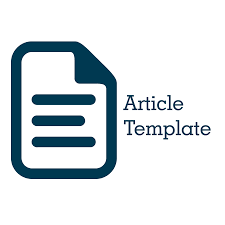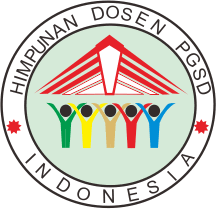Hubungan keterampilan bertanya guru dengan hasil belajar kognitif IPAS materi cerita tentang daerahku kelas IV SD
Abstract
Keywords
References
[1] E. İ. Aka, “An investigation into prospective science teachers' attitudes towards laboratory courses and self-efficacy beliefs in laboratory use,” Int. J. Environ. Sci. Educ., vol. 11, no. 10, pp. 3319–3331, 2016.
[2] N. K. Armini, “Evaluasi metode penilaian perkembangan peserta didik dan pendidikan karakter dalam kurikulum merdeka pada sekolah dasar,” Metta: J. Ilmu Multidisiplin, vol. 4, no. 1, pp. 98–112, 2024.
[3] R. Fitriyah and N. W. Wardani, “Hubungan literasi lingkungan dan hasil belajar IPAS,” J. Pendas Indo, vol. 8, no. 2, pp. 237–243, 2022.
[4] A. Purnomo, A. Candra, and R. Sari, “Hubungan keterampilan bertanya dengan hasil belajar matematika,” J. Basicedu, vol. 3, no. 4, pp. 1–6, 2019.
[5] R. Pradana, H. Mahfud, and A. Supianto, “Penerapan keterampilan bertanya guru untuk meningkatkan keaktifan peserta didik di kelas V SDN Sentul,” Didakt. Dwija Indria, vol. 12, no. 1, pp. 86–92, 2024.
[6] E. Aprianti, D. Runtulalo, and A. M. H. Zaifullah, “The volumetric analysis of porous mixture containing modified plastic waste,” IOP Conf. Ser.: Earth Environ. Sci., vol. 921, no. 1, p. 012075, 2021.
[7] N. D. Lestari, “Analisis penerapan Kurikulum 2013 dalam meningkatkan kualitas pembelajaran ekonomi di SMAN se-Kota Palembang,” J. Neraca: J. Pendidik. Ilmu Ekon. Akuntansi, vol. 2, no. 1, p. 202, 2018.
[8] D. Nurdiansyah, “Penerapan keterampilan bertanya guru dalam pembelajaran,” J. Kependidikan, vol. 9, no. 1, pp. 45–52, 2019.
[9] N. Purnama Sari, “Analisis keterampilan bertanya lanjut guru pada mata pelajaran ilmu pengetahuan alam,” Cahaya Pendidik., vol. 6, no. 2, pp. 139–148, 2020.
[10] A. Indrawan and A. Iklimah, “Individual-based versus group-based instructions in classical guitar teaching at Indonesian tertiary arts education,” Catharsis: J. Arts Educ., vol. 12, no. 1, pp. 1–15, 2023.
[11] S. Lestari, “Keterampilan bertanya lanjut dalam upaya membiasakan peserta didik gemar bertanya dan menyampaikan pendapat dengan benar dalam proses pembelajaran,” J. Ilm. PGSD, vol. 7, no. 2, pp. 104–108, 2015.
[12] Sugiyono, Metode penelitian kuantitatif, kualitatif, dan R&D. Bandung: Alfabeta, 2020.
[13] E. Lestari and M. R. Yudhanegara, Penelitian pendidikan kuantitatif, kualitatif dan R&D. Bandung: Refika Aditama, 2017.
[14] M. Akıllı and S. Kıngır, “Enhancing students’ science achievement through productive science questioning: A quasi-experimental study,” Res. Sci. Educ., vol. 51, no. 3, pp. 889–908, 2021.
[15] P. S. Çetin, “Investigating preservice science teachers’ STEM awareness and their questioning skills,” Sci. Educ. Int., vol. 31, no. 4, pp. 356–364, 2020.
[16] N. Wahyulestari, “Implementasi keterampilan bertanya guru dalam pembelajaran,” J. Pendidik., vol. 7, no. 2, pp. 203–210, 2018.
[17] N. Sugraha, “Implementasi teori belajar konstruktivisme dalam pembelajaran sains,” Humanika: Kajian Ilmiah Mata Kuliah Umum, vol. 19, no. 2, pp. 121–138, 2019.
[18] M. F. Rosyid and U. Baroroh, “Teori belajar kognitif dan implikasinya dalam pembelajaran bahasa Arab,” Lisanuna: J. Ilmu Bahasa Arab dan Pembelajarannya, vol. 9, no. 1, pp. 92–110, 2020.
[19] S. Warinii, Y. N. Hidayat, and D. Ilmi, “Teori belajar sosial dalam pembelajaran,” Anthor: Educ. Learn. J., vol. 2, no. 4, pp. 566–576, 2023.
[20] F. Hidayati, “Penerapan teknik bertanya dalam meningkatkan hasil belajar,” J. Pendas, vol. 8, no. 1, pp. 78–85, 2021.
[21] E. Sulistyowati and A. Kurniawan, “Penerapan strategi Learning Start with a Question (LSQ) untuk meningkatkan keaktifan belajar IPS peserta didik kelas V,” Didakt. Dwija Indria, vol. 7, no. 4, pp. 467–474, 2019.
[22] E. Subekti, S. Kurniati, and F. Salsabila, “Peningkatan motivasi dan hasil belajar matematika melalui model pembelajaran Team Games Tournament (TGT),” Didakt. Dwija Indria, vol. 8, no. 2, pp. 130–140, 2024.
Refbacks
- There are currently no refbacks.



